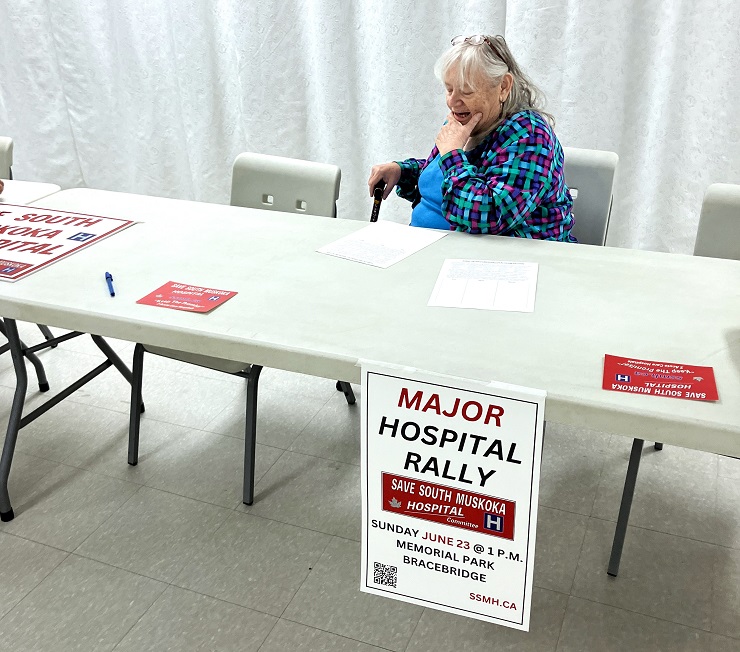FORD GOVERNMENT ‘UNWILLING TO FUND TWO STRONG HOSPITALS’ IN MUSKOKA
Ed. note: Roma Kassian, of Port Carling, made the following submission Tuesday at the Ontario Health Coalition meeting and provided it to MuskokaTODAY.com when asked.
Discussion around proposals for two new hospitals for Muskoka have often been misrepresented as a competition between the communities of Bracebridge and Huntsville, as in a recent Toronto Star headline June 3, ‘Cottage Country at odds over allotment of beds.’
In fact, what we have had, as one doctor expressed it, is “two strong hospitals supporting each other. Which is why we have had such good care in our communities and what we, too, support and ensure.”
It appears that the Ontario Ministry of Health is unwilling to fund what is necessary for two strong hospitals. By denying south Muskoka adequate beds the doctors and community agree are needed.
It is hard to believe that the resources aren’t there, while the government moves forward with a spa for the wealthy on Ontario Place worth at least three quarter of a billion dollars of taxpayers’ money. And also having received 2023 windfall tax revenues of close to $20 billion more than projected for last year alone.
Violation of trust in relation to MAHC board
I would like to address a violation of trust in relation to the MAHC board, which I experienced last week.
Recently, Muskoka Algonquin Healthcare said it was “inviting the communities we serve to join us for a collaborative exchange of ideas to continue to shape the future of our local regional, multi-site hospital system…. a series of community engagement sessions designed to gather input and foster a collaborative dialogue about the proposed multi-site regional hospital capital redevelopment project.”
Calling it dialogue and collaboration doesn’t make it so.

As I entered one of the meetings at the Huntsville District Memorial Hospital, the facilitator introduced himself. He assured me that he would balance time for speaking, between the public and the board.
My experience was that in fact the board was heavily favoured in available time with unnecessarily extensive explanations.
We were cautioned that if we delay accepting the current proposal, we risk losing services and funding from the hospital.
I couldn’t escape the feeling that this was not an open mutual dialogue, but rather a forum for promoting the board’s existing agenda. I did not feel we were listened to openly.
This sense was corroborated Monday (June 10) while seeking verification about an assertion made in response to my question to the board near the end of the meeting.
Since our doctors have provided documented evidence backing up their concerns, I asked: “How do you explain then, the fact that the doctors who have served us so well in our hospital for decades are telling us they won’t be able to manage with the current hospital proposal?”
The facilitator, to my knowledge neither a board member nor a community member, very quickly interjected that all of the lead doctors (credentialed staff leads) at the hospitals have in fact “endorsed the current proposal.”
And that it is the doctors who don’t work at the hospital who are opposed — as if suggesting that they don’t really understand the operations of the hospital.
This was not congruent with my understanding.
Yesterday, I spoke with a hospital lead doctor who unequivocally confirmed that all the doctors have not endorsed the current proposal.
This appears to be a serious misrepresentation of hospital team leads and credentialed staff who share other doctors’ assessment that the proposal is not viable for serving the health care needs of our community in South Muskoka.
Since then I spoke with a Huntsville doctor with the medical advisory committee who also confirmed that the doctors have not endorsed the current proposal, clarifying that the advisory committee doctors agreed to work with the board to amend the current proposal until it meets the needs of the doctors at both hospitals.
Yet on the MAHC website, the following statements are posted, strongly inferring that doctors who are members of the MAHC Medical Advisory Committee and the whole committee endorse the current model.
“The Medical Advisory Committee (MAC) of Muskoka Algonquin Healthcare (MAHC), consisting of department chiefs, clinical committee chairs, medical directors, and physician leads from both North and South Muskoka, has provided its strong endorsement through a consensus statement in support of the proposed health system plan designed to transform regional healthcare delivery.
“We, the members of the MAC, fully support the updated plan for our regional healthcare system as presented by the Project Team. This plan, improved through valuable community feedback, serves as a strong foundation for enhancing healthcare across Muskoka and surrounding areas. It aims to effectively expand our system and ensure each community sees improvements.”
Below is the full statement, the names of all lead doctors of the medical advisory committee are listed, which gave me the impression they have signed on to the statements above.
The full statement can be read at
Devious at best, deceitful at worst
As I understand it, this is far from the only misleading misinformation issued from the board. At best this appears devious, at worst deceitful and divisive. More questions are raised by this than can be addressed at this time.
Many of the new services proposed for the new south Muskoka hospital are those we are accustomed to accessing individually at a distance ourselves, for which we can plan, which do not endanger us when we are vulnerable and at risk, for which tax dollars are not needed to transport us. We can readily continue to be responsible to access more distant services that can be planned for in advance.
Could these be the services that are centralized if it’s necessary to find cost savings, leaving funding available to retain the 40 per cent of hospital beds slated to be cut in south Muskoka under the current proposal, despite our increasing population?
SMMH has been operating between well over capacity for three and a half years and doctors and nurses are exhausted.
Could this allow retention close at hand, of access to acute care in circumstances that may be life-threatening, where the family doctor who knows one’s history as well as family and friends can more readily be present for one?

Patient transfer risk to patients
The risk to patients of transfers over distance has already been documented.
Following the meeting, Dianne George, a senior leadership member of MAHC, approached me to say that I needn’t concern myself about doctors visiting their patients during hospital stays, that though older doctors used to make hospital visits, doctors don’t do so anymore.
The following day I was at South Muskoka Memorial Hospital and there was my young doctor, caring for her patients on the inpatient floor of the hospital.
At last Friday’s community session I attended, it was explained at length that the reason for allotting less beds in Bracebridge is that there will be activation equipment and service at Huntsville where patients needing hospitalization longer than six days will be transferred from SMMH to receive.
The importance of activation was stressed at great length for better care and preparation for release from hospital, which one readily understands.
No mention at all was given to the value of family and community engagement with a patient in their successful recovery. At a time when patients and families are already under stress, travel at a distance burdens them further, if they even have transportation.
What we innately know is corroborated by studies outlining important ways families contribute to care of patients in hospital.
In my experience with my mother, my attention and advocacy spared her a lot of suffering — and on one occasion her life when nurses were unaware of problems that I was present to perceive and bring to their attention.
In the case of serious illness or accident, one study found that traumatized patients recover best in the context of relationship with family and loved ones.
Mental and social well being — cost savings
Elsewhere it was stressed that mental and social well being strongly affects physiological recovery, one of the most important factors being the opportunity to communicate what a person is going through, experiencing it fully and being truly seen and heard by the people around us. And feeling we are held in someone’s mind and heart.
“Research shows family engagement in health care leads to better outcomes, improved patient satisfaction and lower health costs. However family engagement is often overlooked in healthcare settings.”
Questioned about those who have no means of transportation to travel out of the community to visit patients, board representatives gave assurances that transportation for family and friends is part of the plan and budget for the new hospital. As one of our doctors put it, every dollar spent on vehicles, driver wages, and mileage is a dollar that’s not being spent on patient care.
Though the District of Muskoka, working with local transportation companies, has not found a feasible way to provide such service between our towns, we are asked to trust that this very complex, expensive arrangement will materialize, be effective and be sufficient to meet the need.
Will the elderly who don’t drive, and those who have no vehicle, living rurally be picked up at their homes? Will the service be available 24/7 so that families called to the bedside of a dying patient will be with their loved one day or night? Is it realistic for hospitals to be in the transportation business?
Coordination of what is being proposed is extremely complicated. Even now, coordination between the two sites can be challenging.
In one case a surgeon from Bracebridge was called to Huntsville for an emergency where he waited three hours before the patient even arrived because arrangements including transportation for the patient hadn’t been made in advance.
My family doctor tells me that the doctors are not asking for elaborate facilities and equipment, but for the basic tools with which to be able to do their job. Adequate acute care beds are a vital for this.
How can we afford to alienate doctors?
While there is a critical shortage of doctors, how can we afford to alienate our physicians by failing to support their work with the resources they tell us they need?
We’ve been very fortunate for the quality of care they’ve delivered so well for so long.
In my estimation, administrative funding formulas, based on conceptual models, are a consideration.
But the wisdom of experience of those working on the ground day after day, year after year, is better founded and takes precedence in decision making.
It has been pointed out to me that amalgamation of Women’s College Hospital and Sunnybrook hospital was tried and failed — with the two hospitals backing out of the amalgamation in the end — for some of the same reasons that our doctors are concerned about this current MAHC redevelopment proposal.
Thank you for the opportunity to share some of my concerns today.
Roma Kassian, Port Carling
